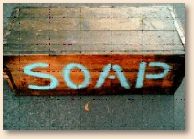 Fly fishers are the true environmentalists.
Fly fishers are the true environmentalists.
You don't have to be old as dirt to remember when only
about six people ever heard of the fly fisherman Aldo Leopold.
Who? See what I mean.
In the 50s (had we ever heard of him) we would have called
him a "conservationist," which is not an insult, for he was an
ardent angler and hunter who had a master of forestry degree
from Yale University and worked for the Forest Service.
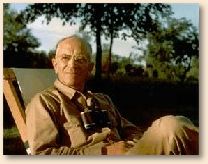 Leopold first wrote Game Management (1933) in which he
discussed preserving natural resources through a combination
of silviculture/forestry, agriculture, biology/zoology, ecology,
and education. He later wrote his most famous essays (published
posthumously in 1949) in which he recognized that there was an
ecological crisis even then and that it had philosophical roots.
Like Emerson and Thoreau, he spent a lot of time with a fishing
rod in his hands and used his time on the streams as an opportunity
to contemplate his surroundings. Environmental problems were
arising, he said, because of how people thought of their environment.
His essays addressed a wide spectrum of environmental issues such
as the death of a species, a land ethic and conservation.
Leopold first wrote Game Management (1933) in which he
discussed preserving natural resources through a combination
of silviculture/forestry, agriculture, biology/zoology, ecology,
and education. He later wrote his most famous essays (published
posthumously in 1949) in which he recognized that there was an
ecological crisis even then and that it had philosophical roots.
Like Emerson and Thoreau, he spent a lot of time with a fishing
rod in his hands and used his time on the streams as an opportunity
to contemplate his surroundings. Environmental problems were
arising, he said, because of how people thought of their environment.
His essays addressed a wide spectrum of environmental issues such
as the death of a species, a land ethic and conservation.
His "land ethic"sounds as if it could be extremist-speak, but it
simply enlarged the boundaries of the global community we all
share to include soils, waters, plants, and animals – collectively:
the land. Here's how he put it:
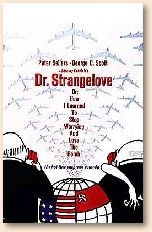
"Conservation is a state of harmony between men and land.
By land is meant all of the things on, over, or in the land…
The land is one organism. Its parts, like our own parts, compete
with each other and cooperate with each other. The competitions
are as much a part of the inner workings as the co-operations.
You can regulate them – cautiously – but not
abolish them…If the land mechanism as a whole is good,
then every part is good, whether we understand it or not. If the
biota, in the course of aeons, has built something we like but do
not understand, then who but a fool would discard seemingly
useless parts? To keep every cog and wheel is the first
precaution of intelligent tinkering."
In other words, don't go killing and spoiling everything, just because you can.
In the 50s and 60s most Americans didn't think about the year
2008, except in terms of what sci-fi predicted, like flying cars
and robot butlers and surviving World War III. Killing things
and spoiling nature were more a way of life than a life style choice.
Trophy hunting, especially big game, was envied, and catching or
shooting only what you could eat was rarely a consideration.
Catch and release meant you needed a better District Attorney,
and a wetlands was some swamp that needed to be reclaimed
before it spawned monsters with an appetite for buxom blondes.
Curiously, deer tags were scarcer than they are today, but that
was because without them there would have been wholesale
slaughter. A bad day on Pecan Island was less than thirty ducks
a man. Two or three hundred Spanish mackerel per fisherman in
Lake Pontchartrain was just average. It was the same mentality
that led some neo-barbarians to arrange cock and dog fights.
Today the politically correct description of these activities is
"repugnant" or "horrid" or "despicable" or….you get the
idea. But (except maybe for the dog fighting) we didn't think
of any of it as wrong. It was just how things were…sort
of like bar brawls and bordellos in St. Landry Parish. And no
one had heard of Leopold.
Of course, when Leopold's essays were reprinted in 1987, they
took on a whole new meaning to the left-wing bleeding-heart
knee-jerk ultra-liberal tree-hugging bunny-kissing pinkos.
Suddenly, non-humans were as valuable as humans, and
hunters and fishermen were evil incarnate. Federal agencies
(minions-of-the-socialist-devil), got tired of respecting private
property, suddenly made it a life's goal to eat away at the fabric
of the 5th Amendment (not that part, the property rights part)
for the good of the environment.
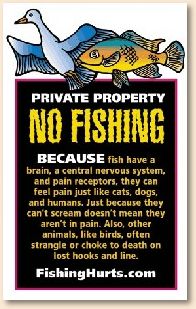 Thibeaux died and found himself in the presence of Satan. The
great devil spoke in a voice that had terrified countless generations.
"You are damned!" the devil yelled …and Thibeaux yawned.
Thibeaux died and found himself in the presence of Satan. The
great devil spoke in a voice that had terrified countless generations.
"You are damned!" the devil yelled …and Thibeaux yawned.
Beelzebub turned himself into his most horrifying countenance
and yelled again "Kneel before me weak mortal!"
…and Thibeaux crossed him arms and sighed distractedly.
The Prince of Darkness got down from his brimstone throne and
threatened Thibeaux with a huge fiery trident. "Eternal torture
awaits you, man!"
…and Thibeaux shook his head and "tsk-tsked."
"You must fear me!" Lucifer demanded. "Why don't you fear me?!"
Thibeaux looked up at Old Nick and answered, "because I've
been married to your sister for 35 years, and she does it much
better than you."
Extremist groups like PETA have gained popularity among
the leftist media and socially elite crowd, because the liberal
press and social sycophants either don't know any better, or
do and are trying to force their own moral code on the rest of
us. In the 50s we called that sort of thing the red menace. In
the 70s, the bunny-kissers started using a word which, if we
had ever heard of it at all, we had only heard teachers use in
a grammatical context – paradigm. Now this perfectly
good word used to mean something that was little more than
"a typical example of word forms," but …when the new
"environmentalists" saw that a "shift" was possible, the term
became to mean a change from the old ways to what they saw
as right thinking. Right thinking? Oh yes, the "paradigm shift"
meant all Americans should be thinking, believing, expressing,
espousing and mandating the bunny-kissers' opinions –
without the need for scientific explanation. Thus arose a new
breed – the environmental "ethicist." For the most part,
these are self proclaimed experts (although some are actually
degreed in ethical philosophy) on morals and rightness. Curiously,
to be an environmental ethicist, your view of ethics must conform
to the code of right thinking. Conservatives and sportsmen don't
qualify.
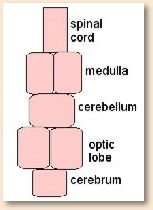
Which brings us back to fishing. PETA hates fishing and would
ban it everywhere. Their reason (other than their pleasure in
taking away something you enjoy) is that it is painful to fish. [To
see some typical PETA anti-fishing propaganda go to
https://www.fishinghurts.com/angling.asp .]
Fact: fish do not feel pain. The neocortex of
the human cerebral hemispheres is responsible for our ability to
experience emotions and sensations such as pain. The existence
of this feature in the fish brain would strengthen a PETA argument
for the ability of fish to experience pain. It would… if fish had this
anatomical component. Instead, the fish brain is dominated by brainstem
components and features very primitive cerebral hemispheres that lack
the neocortex. Dr. James Rose of the University of Wyoming has
explained the distinction between reaction to injury and psychological
experience of pain and emphasizes that the existence of the former
does not evidence the existence of the latter. Sensation of and
reaction to noxious, or potentially harmful, stimuli can and does
occur without the experience of pain.
This is hard for humans to understand because pain is so familiar
to us. Reaction with or without pain is related to "nociception."
Nociception refers to the detection of noxious stimuli by the nervous
system. Certain nervous system receptors – nociceptors –
sense unpleasant stimuli and report to the central nervous system
where motor responses are initiated and the sensation of pain is
perceived. That is, when damage happens somewhere on your body,
appropriate signals are sent to your brain which translates these into
pain. While some fish have nociceptors, this only means that they are
capable of sensing noxious stimuli. Damage to fish causes a signal that
produces a sensory reaction but the fish has no neocortex to translate
the signal into pain. Voila! There is no scientific evidence for fish to
have the psychological experience of pain. No more discussion
necessary, right? Not for PETA.
Want to walk in PETAs shoes? Okay, first you have to forget
science. Now, you must do some right thinking, that is, rationalize
that while fish have a different system of nociception and brain function
from mammals and don't actually experience the precise sensation of
pain that humans do, this does not mean that fish are incapable of
experiencing a negative psychological state analogous to human pain
in response to noxious stimuli. Yes, fish experience discomfort and
fear, so you must interpolate this as psychological trauma. And,
because you want to, you call this response "pain."
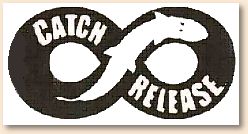
Confused yet? Then pay attention fish-hurter-person!
PETA wants you to assume that because fish have instinctive
reactions to avoid being damaged or dinner, the fish convert
this negative stimuli into an unpleasant psychological state that
is equivalent to pain. It may not actually be pain, but it's
something, soooo‚it must be pain. Then (and here's
where you need a fish whisperer) because there is no hard
evidence that the neuro-physiology of fish supports a pain
reaction (as humans perceive pain) the pinko-you must quietly
slip past the scientific evidence part and assume what you want
to be true is, in fact, true. Unfortunately, as Felix Unger proved,
when you assume you make an "ass" of "u" and "me."
Today's fly fishermen are true environmentalists. Catch and
release is now habitual and rarely are predator species taken
for food. Gaffing and stringers are history and modern texts
do not refer to catching as "killing" (which was the common
term in classic British fishing tomes). By and large, fly fishermen
have an ethical code of which Leopold would approve. Leopold
wrote of wasteful activities as follows:
"Voluntary adherence to an ethical code elevates the self-respect
of the sportsman, but it should not be forgotten that voluntary
disregard of the code degenerates and depraves him. For example,
a common denominator of all sporting codes is not to waste good
meat. Yet it is now a demonstrable fact that Wisconsin deer-hunters,
in their pursuit of a legal buck, kill and abandon in the woods at least
one doe, fawn, or spike buck for every two legal bucks taken out.
In other words, approximately half the hunters shoot any deer until
a legal deer is killed. The illegal carcasses are left where they fall.
Such deer-hunting is not only without social value, but constitutes
actual training for ethical depravity elsewhere."
It may not be solely because we are fly fishers, but you don't
hear about serial killers garroting victims with WF8F, or
terrorists trading in their fly vests for dynamite jackets, or
zealots highjacking planes with nippers. Neither do we
destroy the resources we cherish and we proudly support
rescue and rehabilitation efforts for species and waterways.
Leopold was recently the subject of an exhibition produced
by the American Museum of Fly Fishing (California) and the
Aldo Leopold Nature Center (Wisconsin) proudly holds fishing
events in the Leopold pond. Fly fishers are true environmentalists.
Consider that the FFF Code of Ethics explains:
Fly anglers strive to understand and practice the land ethic
of Aldo Leopold, which extends ethical consideration to the land,
plants, animals, fish, and water that comprise the entire ecosystem.
An important part of this land ethic is that fly anglers support those
programs that sustain high species diversity, and do not support
policies that could cause the premature extinction of another species.
The Native Fish Policy of the Federation of Fly Fishers is based on
this ethic of preventing fish species extinction.
Aldo Leopold, father of wildlife ecology and hero of the modern
environmentalist, loved fly fishing. PETA will never understand…
because they don't want to. ~ Bob Boese (coach)
Credits/references:
A Sand County Almanac and Sketches Here
and There, Oxford University Press, New York 1949, reprinted
in Round River, Oxford University Press, New York 1987.
5th Amendment; "No person shall… be deprived of…property…
without due process of law; nor shall private property be taken for public
use without just compensation."
About Bob:
Robert Lamar Boese has fly fished for five decades. He is an
environmental negotiator, attorney and educator who has provided
environmental legal services for more than thirty-three years including
active duty with the U.S. Coast Guard and Department of Justice. He is a
well known fly tyer with several unique patterns to his credit. He has
developed and authored federal and state regulatory programs
encompassing a broad spectrum of environmental disciplines, has
litigated environmental matters at all levels of the federal and state
court systems, and is a qualified expert for testimony in environmental
law. He has authored over 60 published text chapters, comments or
articles on environmental matters, is a member of the Colorado, District
of Columbia and Louisiana Bar Associations, and is a certified mediator.
In addition to his legal practice, Mr. Boese has been a high school
teacher, an associate professor of Environmental Law and Public Health,
has authored numerous fiction and sports publications, and is a softball
coach and nationally certified volleyball referee. He is the president
of the Acadiana Fly Rodders in Lafayette, Louisiana and editor of
Acadiana on the Fly. He has been married for thirty years and is the
father of two fly fishing girls (25 and 21). For additional information
contact: Boese Environmental Law, 103 Riviera Court, Broussard, LA 70518
or call 337.856.7890 or email coachbob@ymail.com.
|
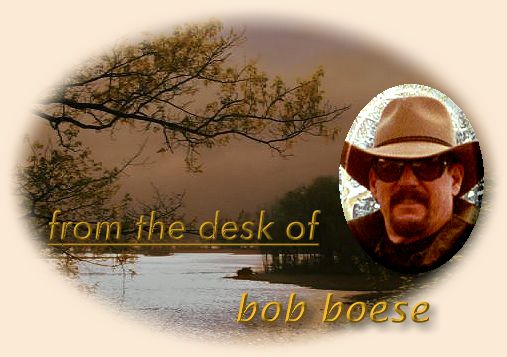

 Leopold first wrote Game Management (1933) in which he
discussed preserving natural resources through a combination
of silviculture/forestry, agriculture, biology/zoology, ecology,
and education. He later wrote his most famous essays (published
posthumously in 1949) in which he recognized that there was an
ecological crisis even then and that it had philosophical roots.
Like Emerson and Thoreau, he spent a lot of time with a fishing
rod in his hands and used his time on the streams as an opportunity
to contemplate his surroundings. Environmental problems were
arising, he said, because of how people thought of their environment.
His essays addressed a wide spectrum of environmental issues such
as the death of a species, a land ethic and conservation.
Leopold first wrote Game Management (1933) in which he
discussed preserving natural resources through a combination
of silviculture/forestry, agriculture, biology/zoology, ecology,
and education. He later wrote his most famous essays (published
posthumously in 1949) in which he recognized that there was an
ecological crisis even then and that it had philosophical roots.
Like Emerson and Thoreau, he spent a lot of time with a fishing
rod in his hands and used his time on the streams as an opportunity
to contemplate his surroundings. Environmental problems were
arising, he said, because of how people thought of their environment.
His essays addressed a wide spectrum of environmental issues such
as the death of a species, a land ethic and conservation. 

 Thibeaux died and found himself in the presence of Satan. The
great devil spoke in a voice that had terrified countless generations.
"You are damned!" the devil yelled …and Thibeaux yawned.
Thibeaux died and found himself in the presence of Satan. The
great devil spoke in a voice that had terrified countless generations.
"You are damned!" the devil yelled …and Thibeaux yawned.
